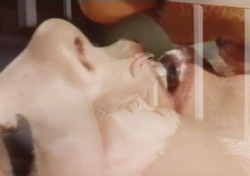
 They say one man’s trash is another man’s treasure. Make that other man a woman — specifically, Down Under filmmaker Sari Braithwaite — and the treasure is [Censored], a documentary constructed solely of film footage once banned by the Australian Censorship Board and now culled from the Australian National Archives. Over the course of 63 minutes, excitement over her find not only fades, but flips, as she narrates each step of a crisis of conscience.
They say one man’s trash is another man’s treasure. Make that other man a woman — specifically, Down Under filmmaker Sari Braithwaite — and the treasure is [Censored], a documentary constructed solely of film footage once banned by the Australian Censorship Board and now culled from the Australian National Archives. Over the course of 63 minutes, excitement over her find not only fades, but flips, as she narrates each step of a crisis of conscience.
Making up the tarnished treasure are those excised portions from 1,991 movies between 1958 and 1971, organized from A to Z — er, Zed. The clips run the gamut of genre and budget, from melodrama to mondo, from cowboys to aliens. In this, her first feature — an outgrowth of her 2015 short, Smut Hounds — Braithwaite considers being confronted this “state-sanctioned spank bank” and wonders, “How do I tell a story with all these scraps?”
 She more than makes do. The displaced frames find a home as she initially sets out to examine and decry her homeland’s history of censorship, grouping the cuts thematically and presenting them with a modicum of context. We get a montage of screen kisses — chaste to erotic, consensual to forced, hetero- to homosexual — and think little of it. Young men then brandish knives, and their serrated machismo strikes the viewer of silly, if nothing else.
She more than makes do. The displaced frames find a home as she initially sets out to examine and decry her homeland’s history of censorship, grouping the cuts thematically and presenting them with a modicum of context. We get a montage of screen kisses — chaste to erotic, consensual to forced, hetero- to homosexual — and think little of it. Young men then brandish knives, and their serrated machismo strikes the viewer of silly, if nothing else.
Then come the slaps — hard, as men backhand wives, girlfriends, mistresses, whores, whomever. Not any one slap bothers on its own, but the cumulative effect of violence is jarring and uncomfortable. As a result, Braithwaite’s thesis comes into focus — and grows sharper with subsequent sequences concerning Peeping Toms, acts of striptease and the act of rape. (Incidentally, the most nerve-wracking scene of all isn’t among these: an extended and unflinchingly graphic childbirth, with more liquid-expelling orifices onscreen at once than your pick of David Cronenberg pictures.)
To acknowledge her point does not mean the audience is required to co-sign. Even those who disagree with her ultimate view can appreciate her journey for its inherent historical value; the documentary is inadvertently star-studded, featuring legends Kirk Douglas, Clint Eastwood, Dean Martin, Steve McQueen and Bob Dylan, who argues over broken glass. The directors represented are no slouch, either, as they include Agnes Varda, Ingmar Bergman and Jean-Luc Godard.
And yet, [Censored] ultimately works not because of them, but because of Braithwaite and her creative collaborators. Primary among them are two who work in tandem here: post-rock outfit The End, whose potent instrumental score helps fuel the considerable tension crafted by editor James Arneman. —Rod Lott
